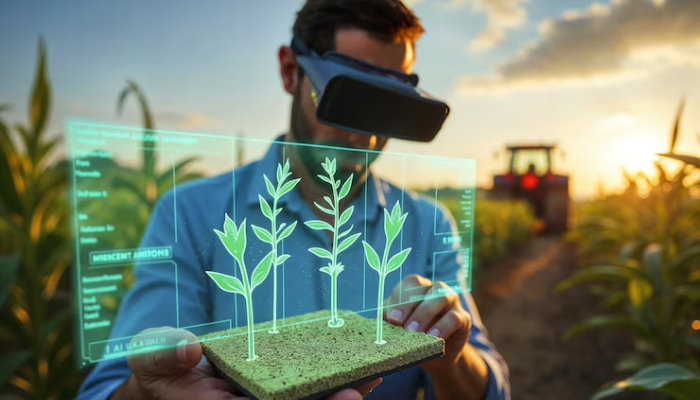Friday, 20 February 2026

The World Economic Forum’s Centre for the Fourth Industrial Revolution (C4IR) India, in collaboration with the Office of the Principal Scientific Adviser to the Government of India and the Ministry of Electronics and Information Technology, has launched a landmark initiative aimed at reshaping the future of Indian agriculture through artificial intelligence. The report, titled Future Farming in India: A Playbook for Scaling Artificial Intelligence in Agriculture, is part of the WEF’s broader AI for India 2030 agenda and seeks to accelerate the country’s transition toward more climate-resilient, productive and market-aware farm systems.
The playbook positions AI not as a distant technological promise, but as a practical tool that can improve crop planning, enhance soil and input management, forecast pest and climate risks, and strengthen linkages between farms and markets. By offering a structured roadmap for implementation, it attempts to bridge the persistent gap between pilot-level innovation and widespread adoption among India’s millions of smallholder farmers.
The paper introduces the IMPACT AI Framework, a three-part model intended to align the roles of government, private industry, startups, and research institutions. Governments are tasked with enabling the foundational ecosystem — from digital public infrastructure and interoperable data systems to supportive policy frameworks and responsible AI standards. Industry players and startups are encouraged to co-create scalable and context-aware AI solutions, while the final step prioritizes last-mile delivery through local extension networks, cooperative bodies, and on-the-ground intermediaries who can translate digital recommendations into practical field-level actions.
A defining feature of the initiative is its emphasis on accessibility. The strategy prioritises regional languages, voice-based interfaces, SMS-driven updates, and community training workshops, acknowledging that the success of digital transformation ultimately rests on whether tools are trusted, usable, and seamlessly integrated into the rhythms of everyday farm management. Rather than bypassing local institutions, the model strengthens existing ones — including Krishi Vigyan Kendras, agricultural extension offices, FPOs, and cooperative channels — positioning them as key vehicles for AI deployment and feedback.
Alongside the agricultural playbook, WEF and its partners also released two companion frameworks: an AI Playbook for SMEs and a white paper outlining the structure of an Indian “AI Sandbox” ecosystem. Developed with support from BCG X, these frameworks offer guidance for scaling AI responsibly across sectors and ensuring that innovation is validated, affordable, and aligned with national priorities.
“India’s AI journey must be defined by how deeply it transforms lives at the last mile,” said Ajay Sood, Principal Scientific Adviser to the Government of India. “The true promise of AI will only be realised when breakthrough technologies translate into widespread adoption that benefits farmers and small enterprises alike.” Jeremy Jurgens, Managing Director at the World Economic Forum, noted that India’s push to embed AI into agriculture and small business represents a major opportunity for economic transformation. “These playbooks provide the clarity needed to move from potential to action,” he said. “With the right partnerships, AI can become a tool that closes divides rather than widens them.”
Gaurav Jindal, Managing Director and Partner at BCG, highlighted the importance of usability and trust. “AI delivers impact when solutions are contextual, affordable, and validated in real conditions. This work charts a path from experimental pilots to true scaled adoption nationwide,” he said.
As India confronts climate volatility, soil stress, rising input costs, and the urgent need to boost farmer incomes, the playbook signals a decisive effort to modernise agriculture in a way that is inclusive, collaborative, and rooted in the realities of Indian farms. More than a blueprint for digital transformation, it positions AI as a lever for economic empowerment — where technology is not the end, but the means to building a more resilient, equitable, and competitive farming ecosystem.